Reflective Journal: Analyzing Skills for Professional Development
VerifiedAdded on 2020/01/28
|15
|3981
|54
Journal and Reflective Writing
AI Summary
This reflective journal analyzes four key skills: adaptability, emotional intelligence, multilingualism, and working under pressure. The introduction defines reflection and its importance. Activity 1 delves into each skill, providing definitions, examples, and questionnaires for self-assessment. Adaptabili...
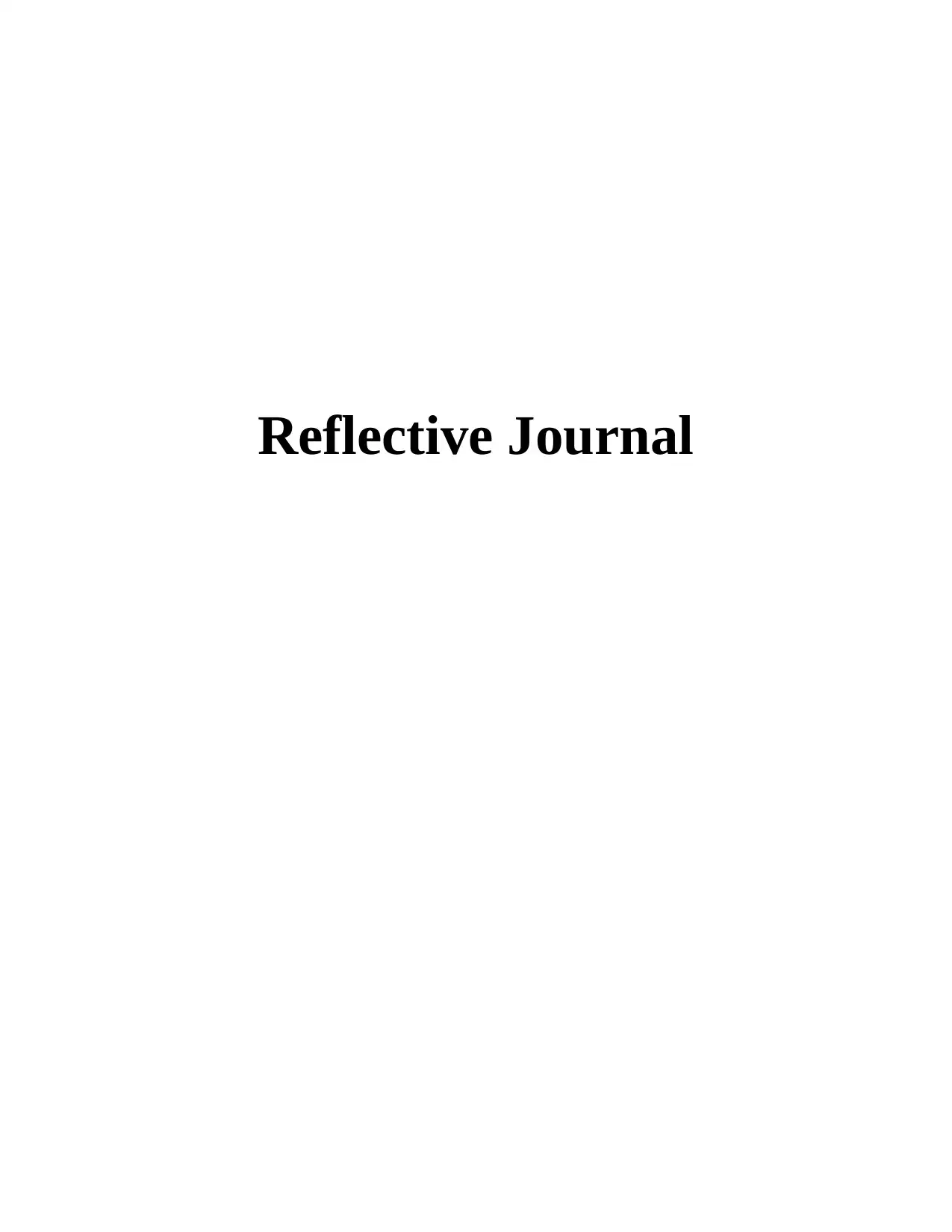
Reflective Journal
Paraphrase This Document
Need a fresh take? Get an instant paraphrase of this document with our AI Paraphraser
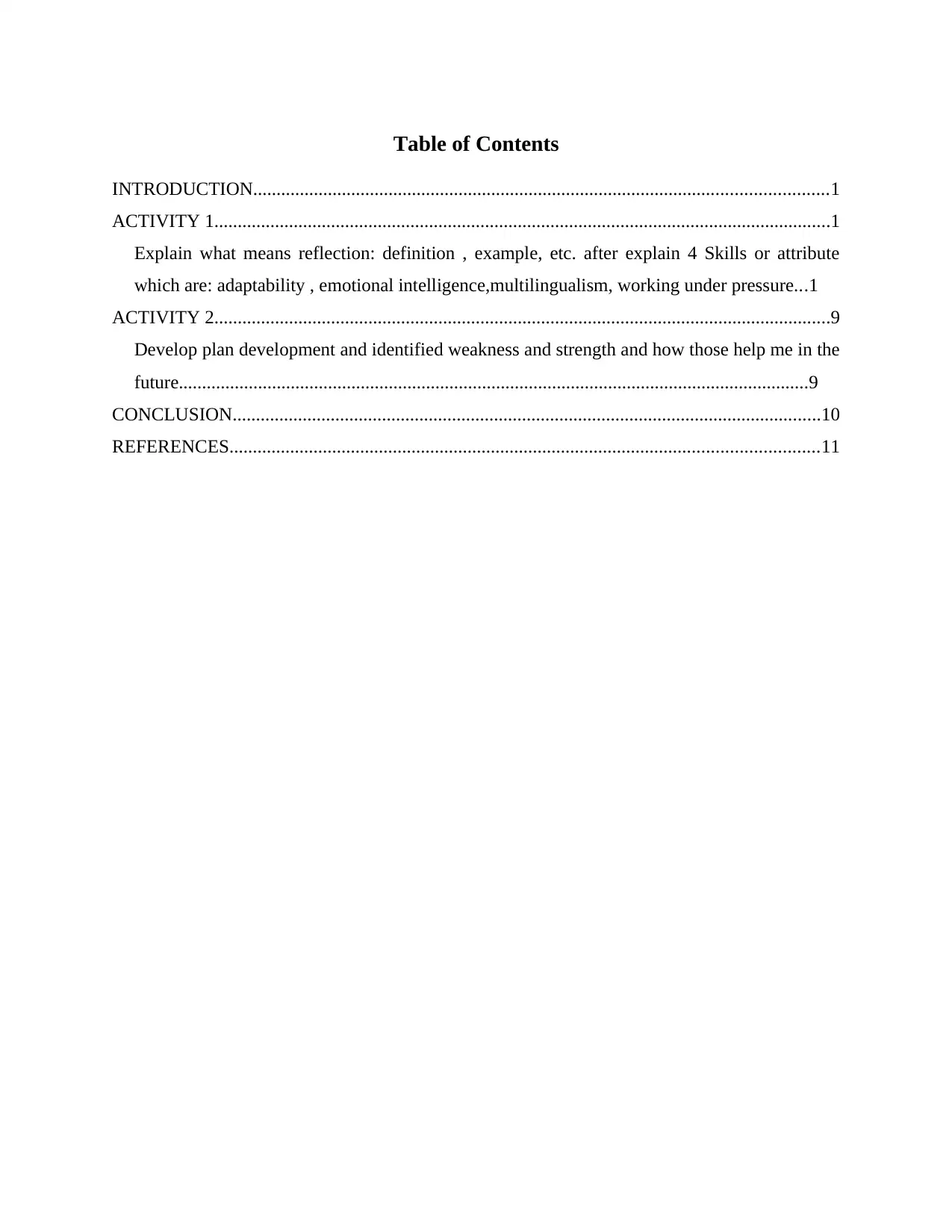
Table of Contents
INTRODUCTION...........................................................................................................................1
ACTIVITY 1....................................................................................................................................1
Explain what means reflection: definition , example, etc. after explain 4 Skills or attribute
which are: adaptability , emotional intelligence,multilingualism, working under pressure...1
ACTIVITY 2....................................................................................................................................9
Develop plan development and identified weakness and strength and how those help me in the
future.......................................................................................................................................9
CONCLUSION..............................................................................................................................10
REFERENCES..............................................................................................................................11
INTRODUCTION...........................................................................................................................1
ACTIVITY 1....................................................................................................................................1
Explain what means reflection: definition , example, etc. after explain 4 Skills or attribute
which are: adaptability , emotional intelligence,multilingualism, working under pressure...1
ACTIVITY 2....................................................................................................................................9
Develop plan development and identified weakness and strength and how those help me in the
future.......................................................................................................................................9
CONCLUSION..............................................................................................................................10
REFERENCES..............................................................................................................................11

⊘ This is a preview!⊘
Do you want full access?
Subscribe today to unlock all pages.

Trusted by 1+ million students worldwide
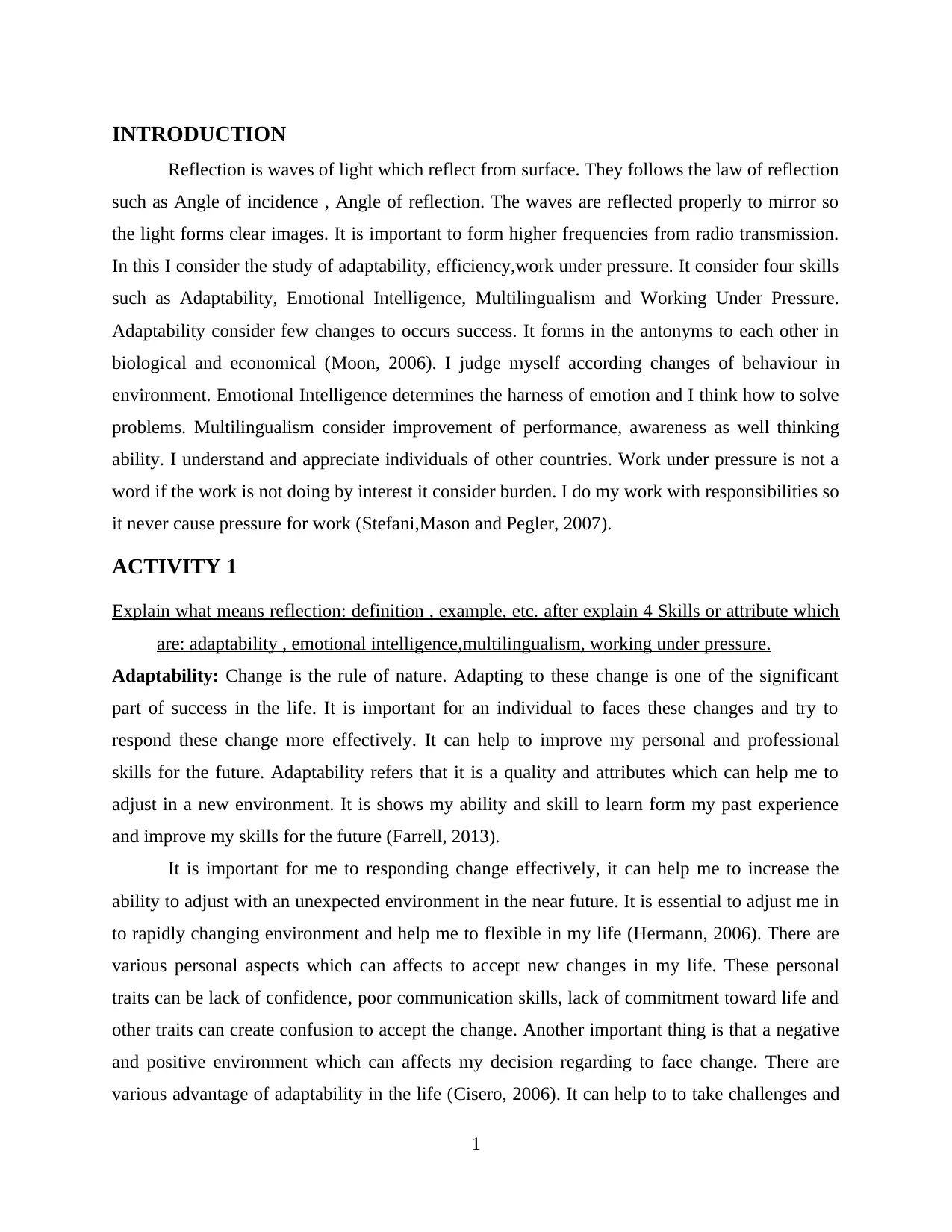
INTRODUCTION
Reflection is waves of light which reflect from surface. They follows the law of reflection
such as Angle of incidence , Angle of reflection. The waves are reflected properly to mirror so
the light forms clear images. It is important to form higher frequencies from radio transmission.
In this I consider the study of adaptability, efficiency,work under pressure. It consider four skills
such as Adaptability, Emotional Intelligence, Multilingualism and Working Under Pressure.
Adaptability consider few changes to occurs success. It forms in the antonyms to each other in
biological and economical (Moon, 2006). I judge myself according changes of behaviour in
environment. Emotional Intelligence determines the harness of emotion and I think how to solve
problems. Multilingualism consider improvement of performance, awareness as well thinking
ability. I understand and appreciate individuals of other countries. Work under pressure is not a
word if the work is not doing by interest it consider burden. I do my work with responsibilities so
it never cause pressure for work (Stefani,Mason and Pegler, 2007).
ACTIVITY 1
Explain what means reflection: definition , example, etc. after explain 4 Skills or attribute which
are: adaptability , emotional intelligence,multilingualism, working under pressure.
Adaptability: Change is the rule of nature. Adapting to these change is one of the significant
part of success in the life. It is important for an individual to faces these changes and try to
respond these change more effectively. It can help to improve my personal and professional
skills for the future. Adaptability refers that it is a quality and attributes which can help me to
adjust in a new environment. It is shows my ability and skill to learn form my past experience
and improve my skills for the future (Farrell, 2013).
It is important for me to responding change effectively, it can help me to increase the
ability to adjust with an unexpected environment in the near future. It is essential to adjust me in
to rapidly changing environment and help me to flexible in my life (Hermann, 2006). There are
various personal aspects which can affects to accept new changes in my life. These personal
traits can be lack of confidence, poor communication skills, lack of commitment toward life and
other traits can create confusion to accept the change. Another important thing is that a negative
and positive environment which can affects my decision regarding to face change. There are
various advantage of adaptability in the life (Cisero, 2006). It can help to to take challenges and
1
Reflection is waves of light which reflect from surface. They follows the law of reflection
such as Angle of incidence , Angle of reflection. The waves are reflected properly to mirror so
the light forms clear images. It is important to form higher frequencies from radio transmission.
In this I consider the study of adaptability, efficiency,work under pressure. It consider four skills
such as Adaptability, Emotional Intelligence, Multilingualism and Working Under Pressure.
Adaptability consider few changes to occurs success. It forms in the antonyms to each other in
biological and economical (Moon, 2006). I judge myself according changes of behaviour in
environment. Emotional Intelligence determines the harness of emotion and I think how to solve
problems. Multilingualism consider improvement of performance, awareness as well thinking
ability. I understand and appreciate individuals of other countries. Work under pressure is not a
word if the work is not doing by interest it consider burden. I do my work with responsibilities so
it never cause pressure for work (Stefani,Mason and Pegler, 2007).
ACTIVITY 1
Explain what means reflection: definition , example, etc. after explain 4 Skills or attribute which
are: adaptability , emotional intelligence,multilingualism, working under pressure.
Adaptability: Change is the rule of nature. Adapting to these change is one of the significant
part of success in the life. It is important for an individual to faces these changes and try to
respond these change more effectively. It can help to improve my personal and professional
skills for the future. Adaptability refers that it is a quality and attributes which can help me to
adjust in a new environment. It is shows my ability and skill to learn form my past experience
and improve my skills for the future (Farrell, 2013).
It is important for me to responding change effectively, it can help me to increase the
ability to adjust with an unexpected environment in the near future. It is essential to adjust me in
to rapidly changing environment and help me to flexible in my life (Hermann, 2006). There are
various personal aspects which can affects to accept new changes in my life. These personal
traits can be lack of confidence, poor communication skills, lack of commitment toward life and
other traits can create confusion to accept the change. Another important thing is that a negative
and positive environment which can affects my decision regarding to face change. There are
various advantage of adaptability in the life (Cisero, 2006). It can help to to take challenges and
1
Paraphrase This Document
Need a fresh take? Get an instant paraphrase of this document with our AI Paraphraser
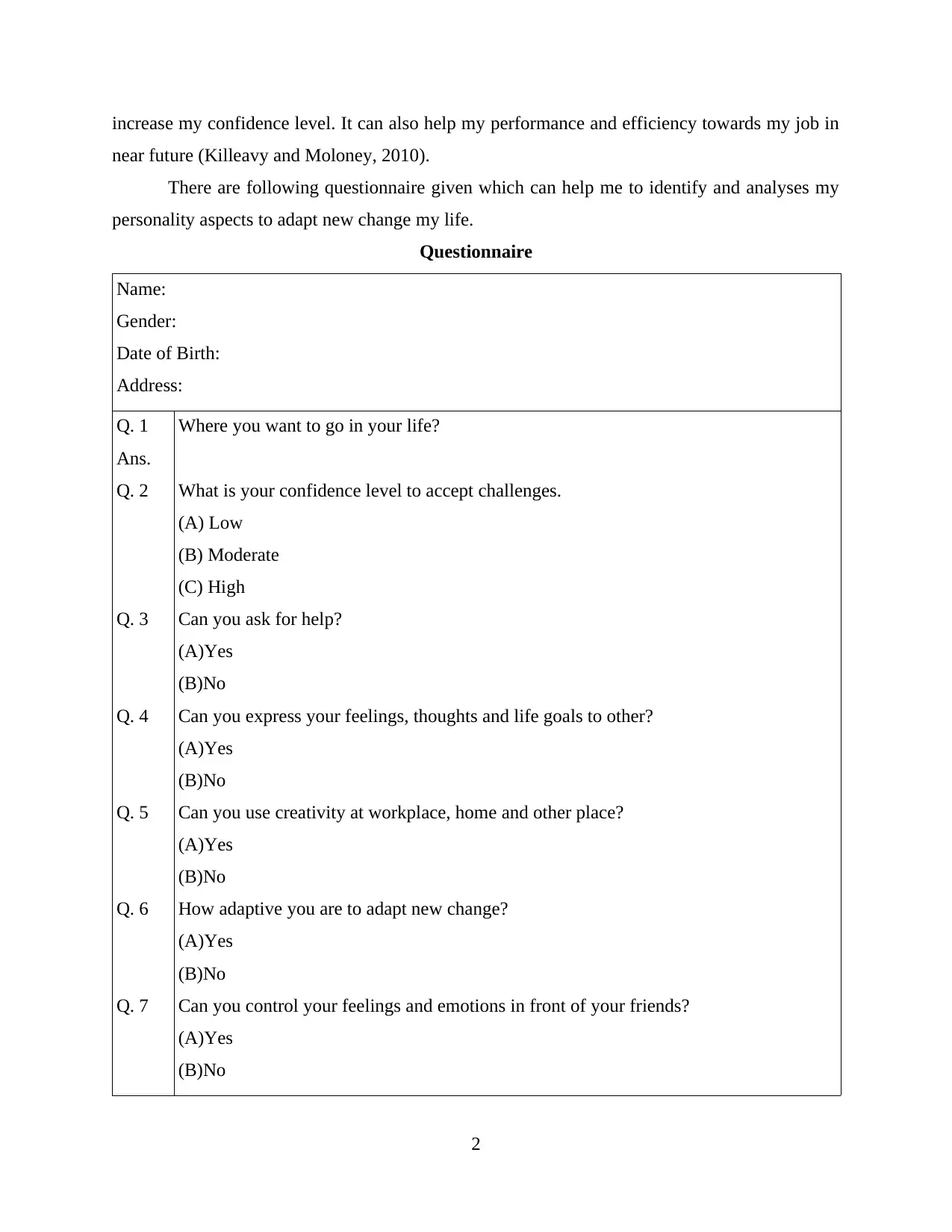
increase my confidence level. It can also help my performance and efficiency towards my job in
near future (Killeavy and Moloney, 2010).
There are following questionnaire given which can help me to identify and analyses my
personality aspects to adapt new change my life.
Questionnaire
Name:
Gender:
Date of Birth:
Address:
Q. 1
Ans.
Q. 2
Q. 3
Q. 4
Q. 5
Q. 6
Q. 7
Where you want to go in your life?
What is your confidence level to accept challenges.
(A) Low
(B) Moderate
(C) High
Can you ask for help?
(A)Yes
(B)No
Can you express your feelings, thoughts and life goals to other?
(A)Yes
(B)No
Can you use creativity at workplace, home and other place?
(A)Yes
(B)No
How adaptive you are to adapt new change?
(A)Yes
(B)No
Can you control your feelings and emotions in front of your friends?
(A)Yes
(B)No
2
near future (Killeavy and Moloney, 2010).
There are following questionnaire given which can help me to identify and analyses my
personality aspects to adapt new change my life.
Questionnaire
Name:
Gender:
Date of Birth:
Address:
Q. 1
Ans.
Q. 2
Q. 3
Q. 4
Q. 5
Q. 6
Q. 7
Where you want to go in your life?
What is your confidence level to accept challenges.
(A) Low
(B) Moderate
(C) High
Can you ask for help?
(A)Yes
(B)No
Can you express your feelings, thoughts and life goals to other?
(A)Yes
(B)No
Can you use creativity at workplace, home and other place?
(A)Yes
(B)No
How adaptive you are to adapt new change?
(A)Yes
(B)No
Can you control your feelings and emotions in front of your friends?
(A)Yes
(B)No
2
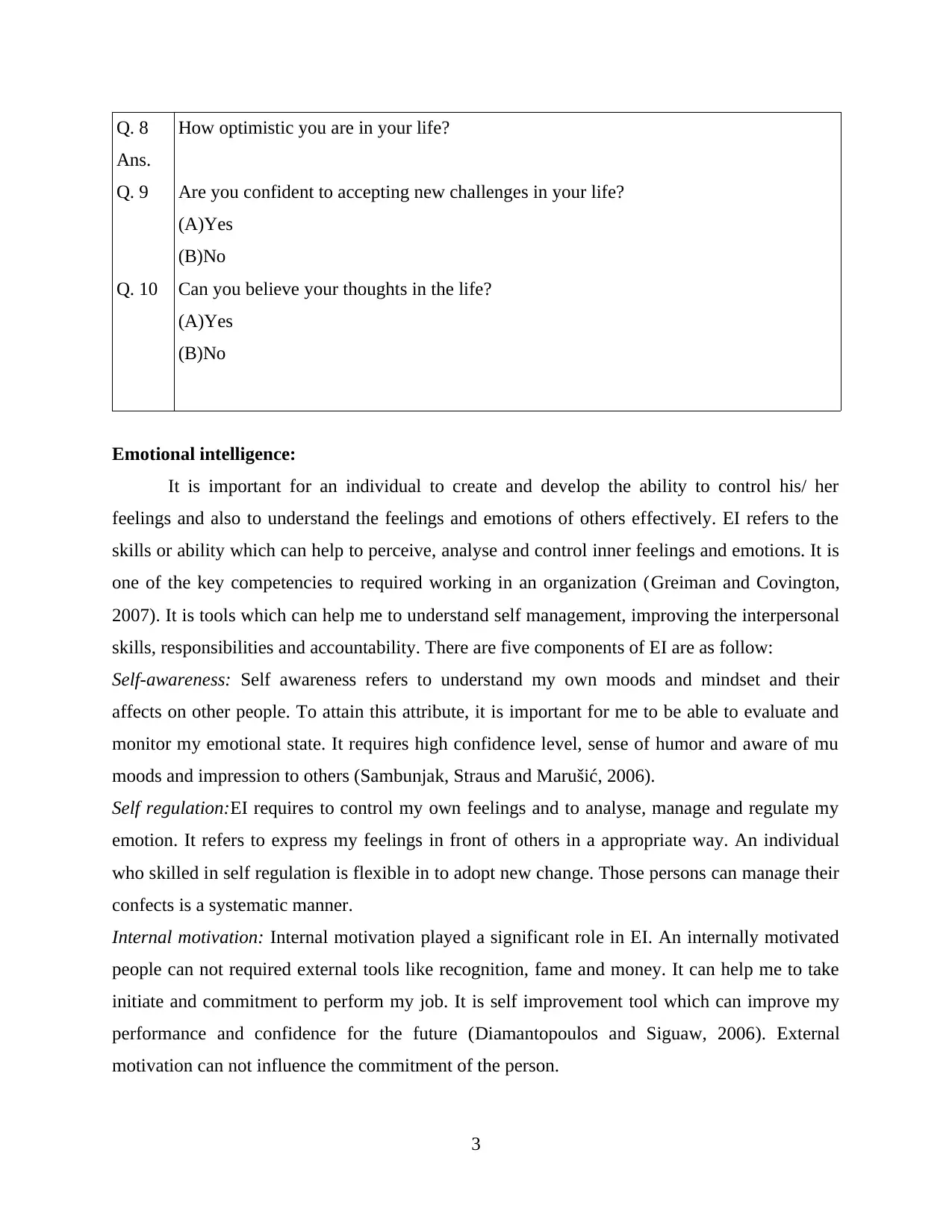
Q. 8
Ans.
Q. 9
Q. 10
How optimistic you are in your life?
Are you confident to accepting new challenges in your life?
(A)Yes
(B)No
Can you believe your thoughts in the life?
(A)Yes
(B)No
Emotional intelligence:
It is important for an individual to create and develop the ability to control his/ her
feelings and also to understand the feelings and emotions of others effectively. EI refers to the
skills or ability which can help to perceive, analyse and control inner feelings and emotions. It is
one of the key competencies to required working in an organization (Greiman and Covington,
2007). It is tools which can help me to understand self management, improving the interpersonal
skills, responsibilities and accountability. There are five components of EI are as follow:
Self-awareness: Self awareness refers to understand my own moods and mindset and their
affects on other people. To attain this attribute, it is important for me to be able to evaluate and
monitor my emotional state. It requires high confidence level, sense of humor and aware of mu
moods and impression to others (Sambunjak, Straus and Marušić, 2006).
Self regulation:EI requires to control my own feelings and to analyse, manage and regulate my
emotion. It refers to express my feelings in front of others in a appropriate way. An individual
who skilled in self regulation is flexible in to adopt new change. Those persons can manage their
confects is a systematic manner.
Internal motivation: Internal motivation played a significant role in EI. An internally motivated
people can not required external tools like recognition, fame and money. It can help me to take
initiate and commitment to perform my job. It is self improvement tool which can improve my
performance and confidence for the future (Diamantopoulos and Siguaw, 2006). External
motivation can not influence the commitment of the person.
3
Ans.
Q. 9
Q. 10
How optimistic you are in your life?
Are you confident to accepting new challenges in your life?
(A)Yes
(B)No
Can you believe your thoughts in the life?
(A)Yes
(B)No
Emotional intelligence:
It is important for an individual to create and develop the ability to control his/ her
feelings and also to understand the feelings and emotions of others effectively. EI refers to the
skills or ability which can help to perceive, analyse and control inner feelings and emotions. It is
one of the key competencies to required working in an organization (Greiman and Covington,
2007). It is tools which can help me to understand self management, improving the interpersonal
skills, responsibilities and accountability. There are five components of EI are as follow:
Self-awareness: Self awareness refers to understand my own moods and mindset and their
affects on other people. To attain this attribute, it is important for me to be able to evaluate and
monitor my emotional state. It requires high confidence level, sense of humor and aware of mu
moods and impression to others (Sambunjak, Straus and Marušić, 2006).
Self regulation:EI requires to control my own feelings and to analyse, manage and regulate my
emotion. It refers to express my feelings in front of others in a appropriate way. An individual
who skilled in self regulation is flexible in to adopt new change. Those persons can manage their
confects is a systematic manner.
Internal motivation: Internal motivation played a significant role in EI. An internally motivated
people can not required external tools like recognition, fame and money. It can help me to take
initiate and commitment to perform my job. It is self improvement tool which can improve my
performance and confidence for the future (Diamantopoulos and Siguaw, 2006). External
motivation can not influence the commitment of the person.
3
⊘ This is a preview!⊘
Do you want full access?
Subscribe today to unlock all pages.

Trusted by 1+ million students worldwide
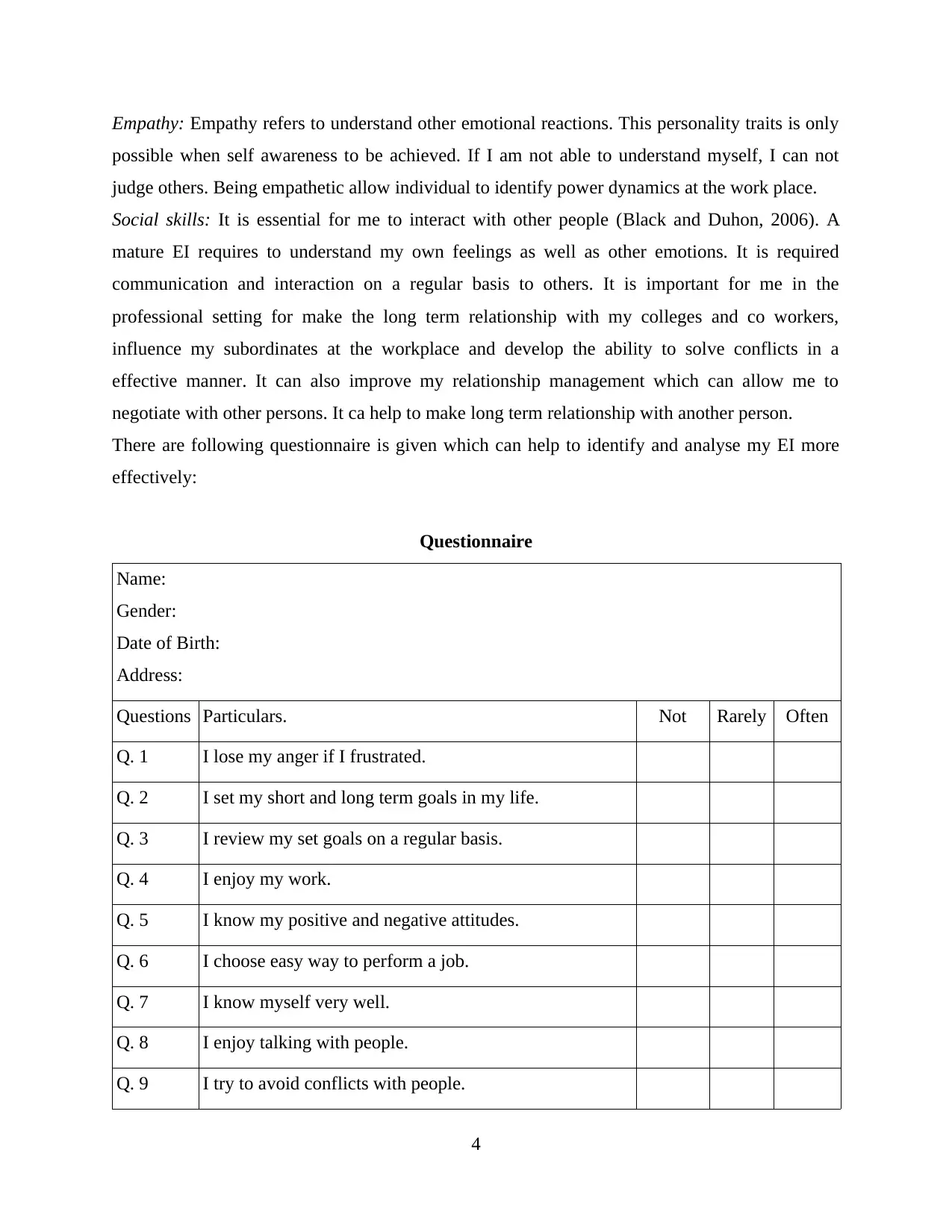
Empathy: Empathy refers to understand other emotional reactions. This personality traits is only
possible when self awareness to be achieved. If I am not able to understand myself, I can not
judge others. Being empathetic allow individual to identify power dynamics at the work place.
Social skills: It is essential for me to interact with other people (Black and Duhon, 2006). A
mature EI requires to understand my own feelings as well as other emotions. It is required
communication and interaction on a regular basis to others. It is important for me in the
professional setting for make the long term relationship with my colleges and co workers,
influence my subordinates at the workplace and develop the ability to solve conflicts in a
effective manner. It can also improve my relationship management which can allow me to
negotiate with other persons. It ca help to make long term relationship with another person.
There are following questionnaire is given which can help to identify and analyse my EI more
effectively:
Questionnaire
Name:
Gender:
Date of Birth:
Address:
Questions Particulars. Not Rarely Often
Q. 1 I lose my anger if I frustrated.
Q. 2 I set my short and long term goals in my life.
Q. 3 I review my set goals on a regular basis.
Q. 4 I enjoy my work.
Q. 5 I know my positive and negative attitudes.
Q. 6 I choose easy way to perform a job.
Q. 7 I know myself very well.
Q. 8 I enjoy talking with people.
Q. 9 I try to avoid conflicts with people.
4
possible when self awareness to be achieved. If I am not able to understand myself, I can not
judge others. Being empathetic allow individual to identify power dynamics at the work place.
Social skills: It is essential for me to interact with other people (Black and Duhon, 2006). A
mature EI requires to understand my own feelings as well as other emotions. It is required
communication and interaction on a regular basis to others. It is important for me in the
professional setting for make the long term relationship with my colleges and co workers,
influence my subordinates at the workplace and develop the ability to solve conflicts in a
effective manner. It can also improve my relationship management which can allow me to
negotiate with other persons. It ca help to make long term relationship with another person.
There are following questionnaire is given which can help to identify and analyse my EI more
effectively:
Questionnaire
Name:
Gender:
Date of Birth:
Address:
Questions Particulars. Not Rarely Often
Q. 1 I lose my anger if I frustrated.
Q. 2 I set my short and long term goals in my life.
Q. 3 I review my set goals on a regular basis.
Q. 4 I enjoy my work.
Q. 5 I know my positive and negative attitudes.
Q. 6 I choose easy way to perform a job.
Q. 7 I know myself very well.
Q. 8 I enjoy talking with people.
Q. 9 I try to avoid conflicts with people.
4
Paraphrase This Document
Need a fresh take? Get an instant paraphrase of this document with our AI Paraphraser
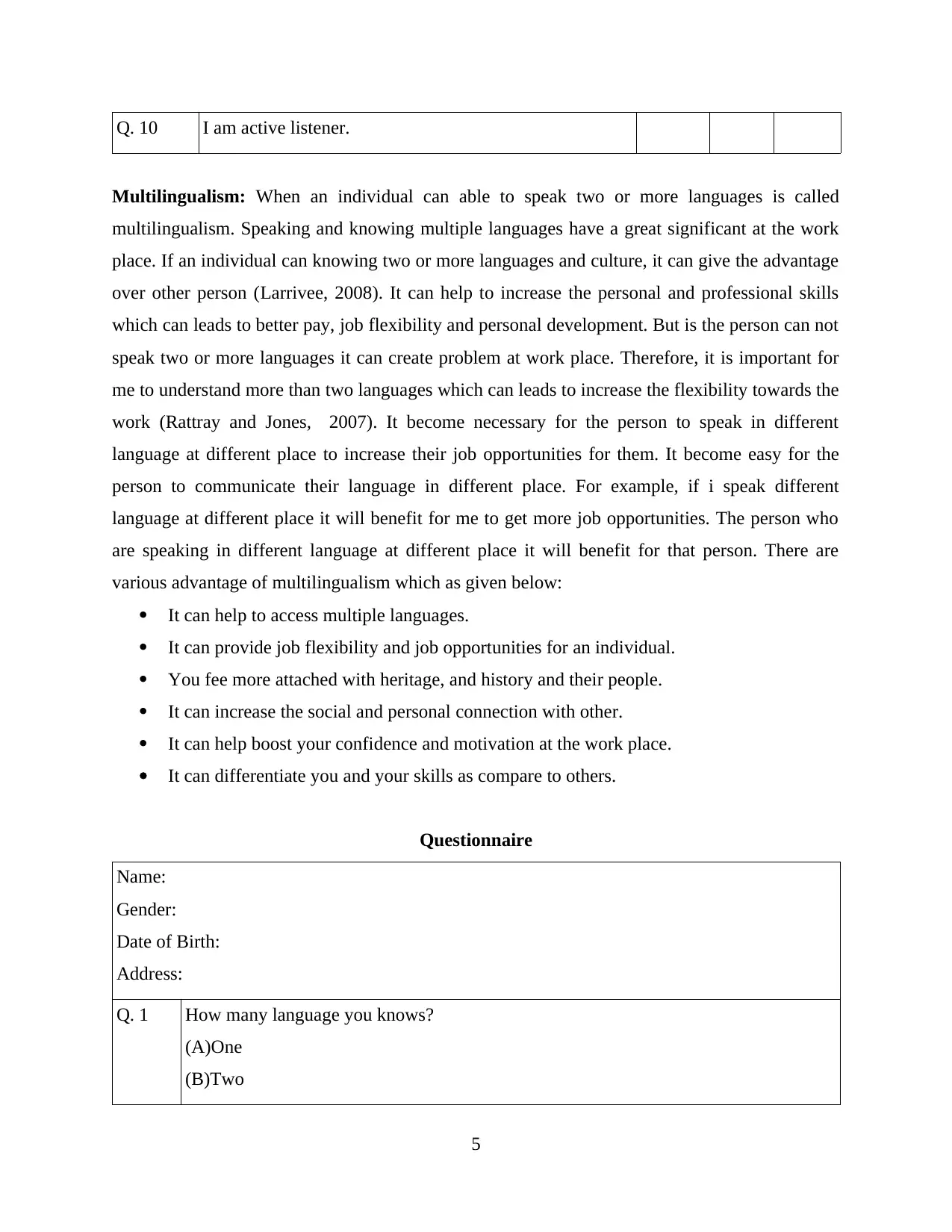
Q. 10 I am active listener.
Multilingualism: When an individual can able to speak two or more languages is called
multilingualism. Speaking and knowing multiple languages have a great significant at the work
place. If an individual can knowing two or more languages and culture, it can give the advantage
over other person (Larrivee, 2008). It can help to increase the personal and professional skills
which can leads to better pay, job flexibility and personal development. But is the person can not
speak two or more languages it can create problem at work place. Therefore, it is important for
me to understand more than two languages which can leads to increase the flexibility towards the
work (Rattray and Jones, 2007). It become necessary for the person to speak in different
language at different place to increase their job opportunities for them. It become easy for the
person to communicate their language in different place. For example, if i speak different
language at different place it will benefit for me to get more job opportunities. The person who
are speaking in different language at different place it will benefit for that person. There are
various advantage of multilingualism which as given below:
It can help to access multiple languages.
It can provide job flexibility and job opportunities for an individual.
You fee more attached with heritage, and history and their people.
It can increase the social and personal connection with other.
It can help boost your confidence and motivation at the work place.
It can differentiate you and your skills as compare to others.
Questionnaire
Name:
Gender:
Date of Birth:
Address:
Q. 1 How many language you knows?
(A)One
(B)Two
5
Multilingualism: When an individual can able to speak two or more languages is called
multilingualism. Speaking and knowing multiple languages have a great significant at the work
place. If an individual can knowing two or more languages and culture, it can give the advantage
over other person (Larrivee, 2008). It can help to increase the personal and professional skills
which can leads to better pay, job flexibility and personal development. But is the person can not
speak two or more languages it can create problem at work place. Therefore, it is important for
me to understand more than two languages which can leads to increase the flexibility towards the
work (Rattray and Jones, 2007). It become necessary for the person to speak in different
language at different place to increase their job opportunities for them. It become easy for the
person to communicate their language in different place. For example, if i speak different
language at different place it will benefit for me to get more job opportunities. The person who
are speaking in different language at different place it will benefit for that person. There are
various advantage of multilingualism which as given below:
It can help to access multiple languages.
It can provide job flexibility and job opportunities for an individual.
You fee more attached with heritage, and history and their people.
It can increase the social and personal connection with other.
It can help boost your confidence and motivation at the work place.
It can differentiate you and your skills as compare to others.
Questionnaire
Name:
Gender:
Date of Birth:
Address:
Q. 1 How many language you knows?
(A)One
(B)Two
5
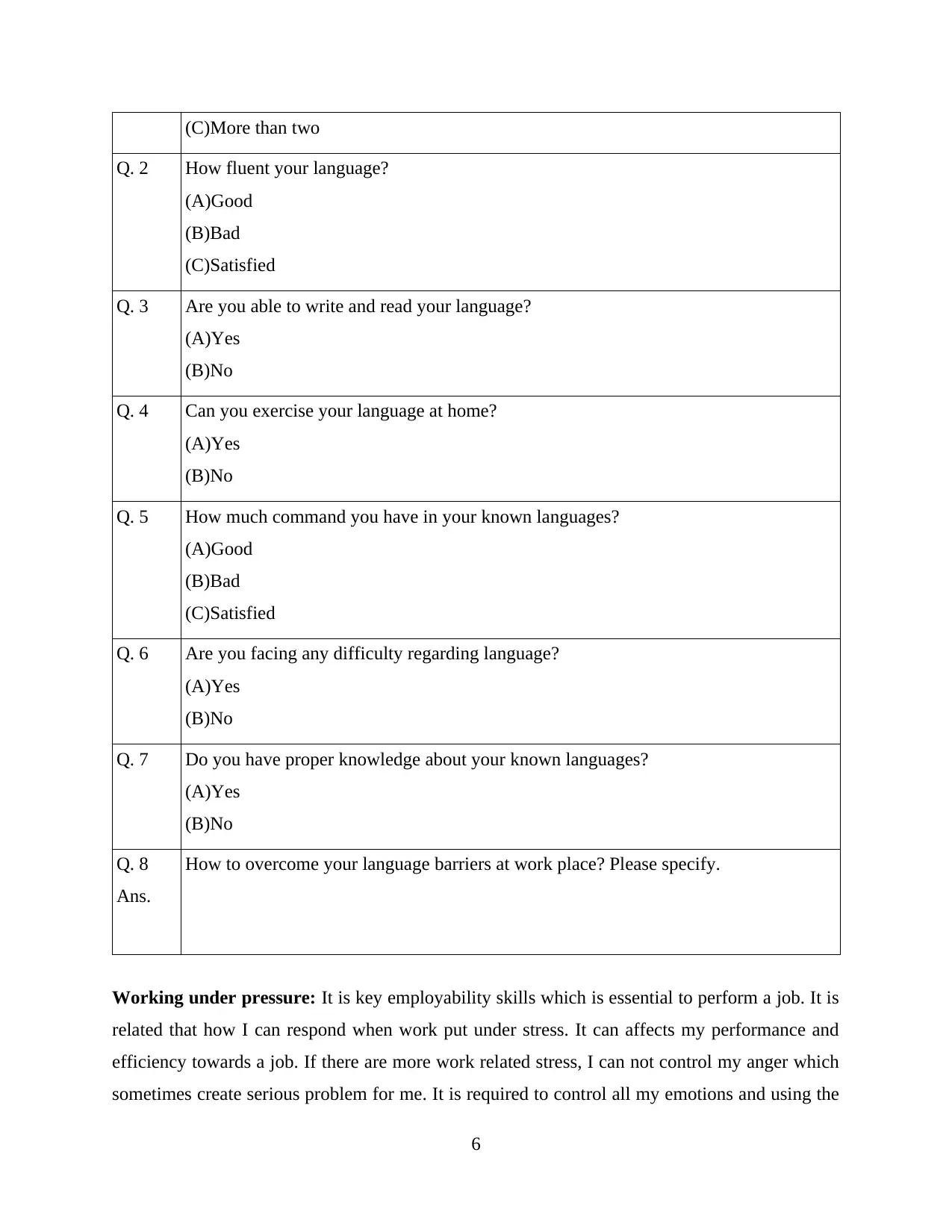
(C)More than two
Q. 2 How fluent your language?
(A)Good
(B)Bad
(C)Satisfied
Q. 3 Are you able to write and read your language?
(A)Yes
(B)No
Q. 4 Can you exercise your language at home?
(A)Yes
(B)No
Q. 5 How much command you have in your known languages?
(A)Good
(B)Bad
(C)Satisfied
Q. 6 Are you facing any difficulty regarding language?
(A)Yes
(B)No
Q. 7 Do you have proper knowledge about your known languages?
(A)Yes
(B)No
Q. 8
Ans.
How to overcome your language barriers at work place? Please specify.
Working under pressure: It is key employability skills which is essential to perform a job. It is
related that how I can respond when work put under stress. It can affects my performance and
efficiency towards a job. If there are more work related stress, I can not control my anger which
sometimes create serious problem for me. It is required to control all my emotions and using the
6
Q. 2 How fluent your language?
(A)Good
(B)Bad
(C)Satisfied
Q. 3 Are you able to write and read your language?
(A)Yes
(B)No
Q. 4 Can you exercise your language at home?
(A)Yes
(B)No
Q. 5 How much command you have in your known languages?
(A)Good
(B)Bad
(C)Satisfied
Q. 6 Are you facing any difficulty regarding language?
(A)Yes
(B)No
Q. 7 Do you have proper knowledge about your known languages?
(A)Yes
(B)No
Q. 8
Ans.
How to overcome your language barriers at work place? Please specify.
Working under pressure: It is key employability skills which is essential to perform a job. It is
related that how I can respond when work put under stress. It can affects my performance and
efficiency towards a job. If there are more work related stress, I can not control my anger which
sometimes create serious problem for me. It is required to control all my emotions and using the
6
⊘ This is a preview!⊘
Do you want full access?
Subscribe today to unlock all pages.

Trusted by 1+ million students worldwide
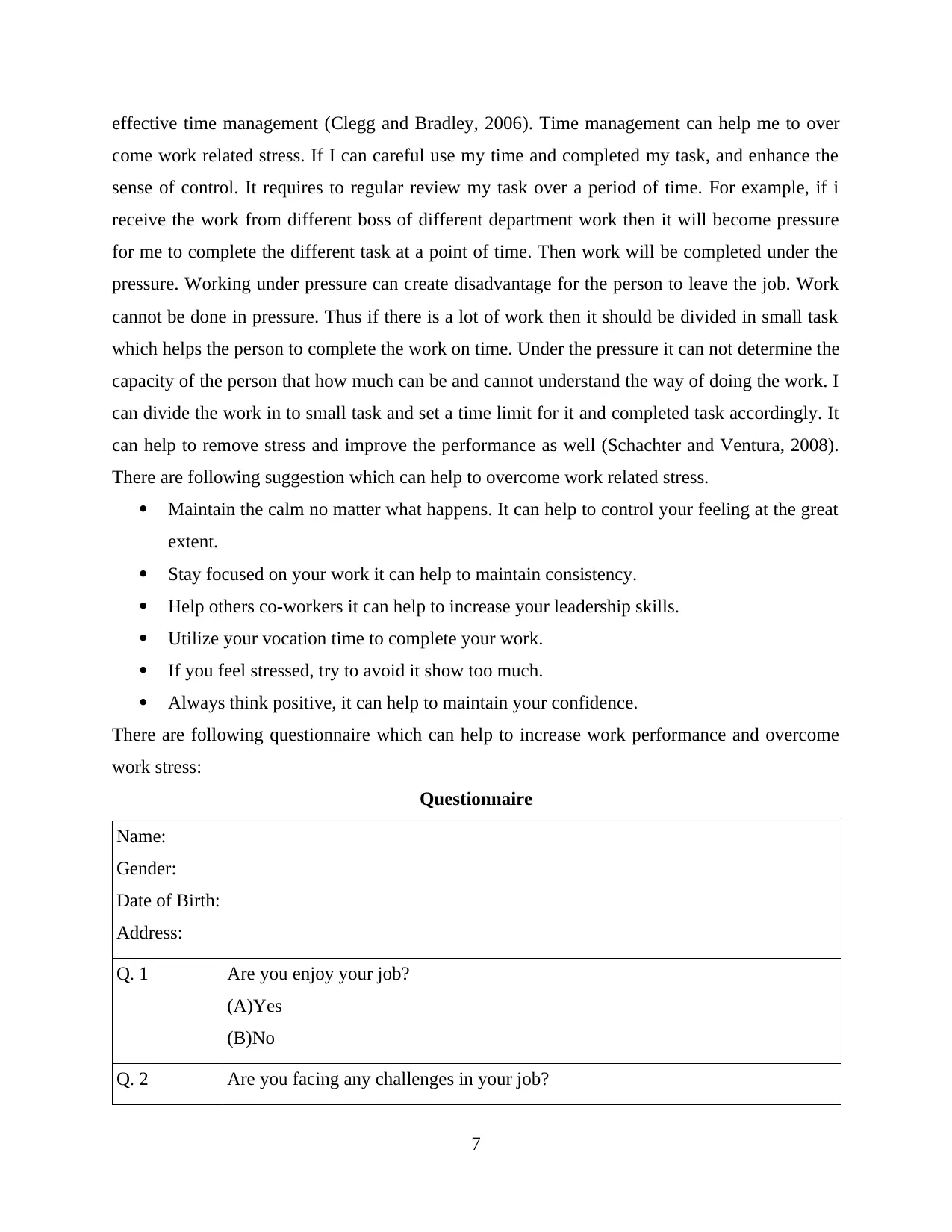
effective time management (Clegg and Bradley, 2006). Time management can help me to over
come work related stress. If I can careful use my time and completed my task, and enhance the
sense of control. It requires to regular review my task over a period of time. For example, if i
receive the work from different boss of different department work then it will become pressure
for me to complete the different task at a point of time. Then work will be completed under the
pressure. Working under pressure can create disadvantage for the person to leave the job. Work
cannot be done in pressure. Thus if there is a lot of work then it should be divided in small task
which helps the person to complete the work on time. Under the pressure it can not determine the
capacity of the person that how much can be and cannot understand the way of doing the work. I
can divide the work in to small task and set a time limit for it and completed task accordingly. It
can help to remove stress and improve the performance as well (Schachter and Ventura, 2008).
There are following suggestion which can help to overcome work related stress.
Maintain the calm no matter what happens. It can help to control your feeling at the great
extent.
Stay focused on your work it can help to maintain consistency.
Help others co-workers it can help to increase your leadership skills.
Utilize your vocation time to complete your work.
If you feel stressed, try to avoid it show too much.
Always think positive, it can help to maintain your confidence.
There are following questionnaire which can help to increase work performance and overcome
work stress:
Questionnaire
Name:
Gender:
Date of Birth:
Address:
Q. 1 Are you enjoy your job?
(A)Yes
(B)No
Q. 2 Are you facing any challenges in your job?
7
come work related stress. If I can careful use my time and completed my task, and enhance the
sense of control. It requires to regular review my task over a period of time. For example, if i
receive the work from different boss of different department work then it will become pressure
for me to complete the different task at a point of time. Then work will be completed under the
pressure. Working under pressure can create disadvantage for the person to leave the job. Work
cannot be done in pressure. Thus if there is a lot of work then it should be divided in small task
which helps the person to complete the work on time. Under the pressure it can not determine the
capacity of the person that how much can be and cannot understand the way of doing the work. I
can divide the work in to small task and set a time limit for it and completed task accordingly. It
can help to remove stress and improve the performance as well (Schachter and Ventura, 2008).
There are following suggestion which can help to overcome work related stress.
Maintain the calm no matter what happens. It can help to control your feeling at the great
extent.
Stay focused on your work it can help to maintain consistency.
Help others co-workers it can help to increase your leadership skills.
Utilize your vocation time to complete your work.
If you feel stressed, try to avoid it show too much.
Always think positive, it can help to maintain your confidence.
There are following questionnaire which can help to increase work performance and overcome
work stress:
Questionnaire
Name:
Gender:
Date of Birth:
Address:
Q. 1 Are you enjoy your job?
(A)Yes
(B)No
Q. 2 Are you facing any challenges in your job?
7
Paraphrase This Document
Need a fresh take? Get an instant paraphrase of this document with our AI Paraphraser
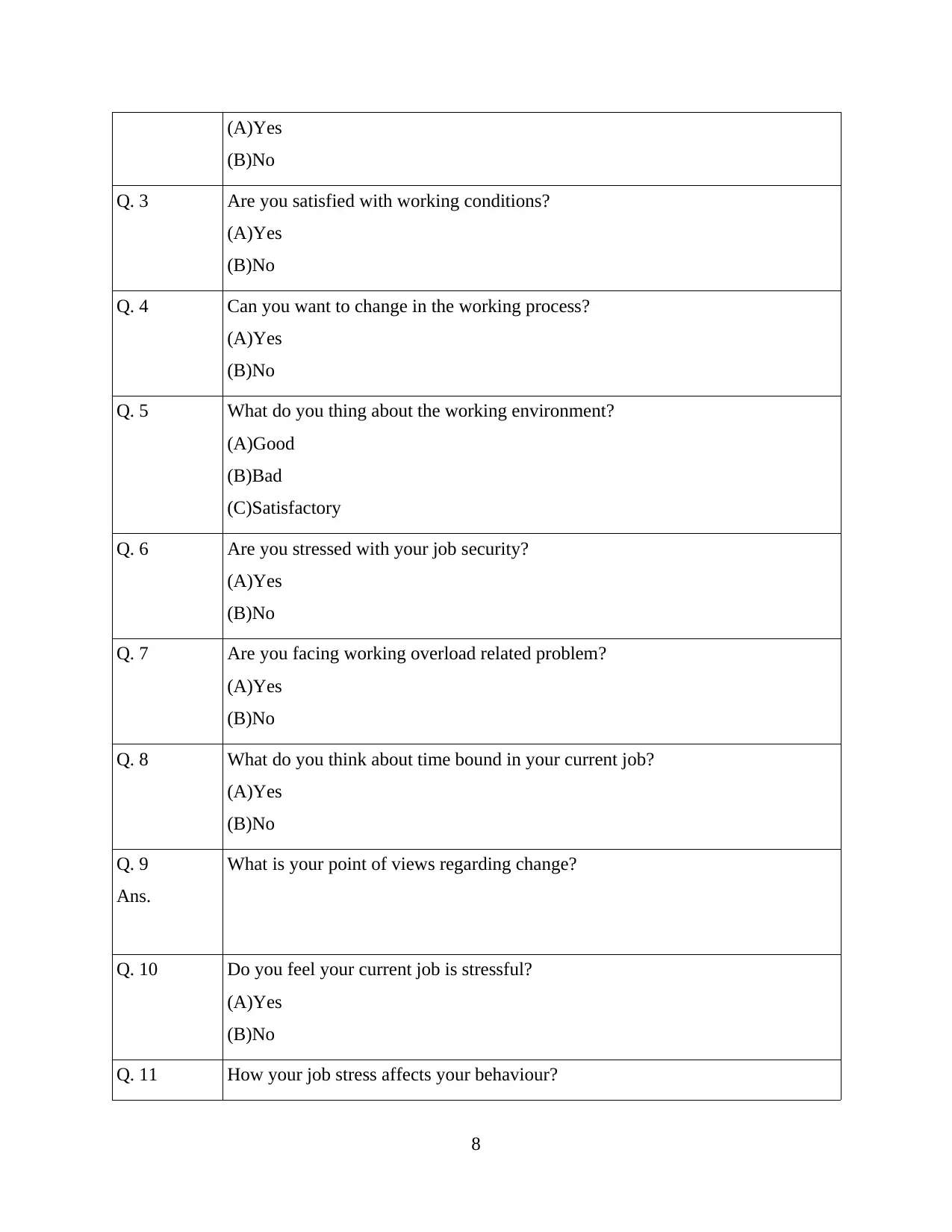
(A)Yes
(B)No
Q. 3 Are you satisfied with working conditions?
(A)Yes
(B)No
Q. 4 Can you want to change in the working process?
(A)Yes
(B)No
Q. 5 What do you thing about the working environment?
(A)Good
(B)Bad
(C)Satisfactory
Q. 6 Are you stressed with your job security?
(A)Yes
(B)No
Q. 7 Are you facing working overload related problem?
(A)Yes
(B)No
Q. 8 What do you think about time bound in your current job?
(A)Yes
(B)No
Q. 9
Ans.
What is your point of views regarding change?
Q. 10 Do you feel your current job is stressful?
(A)Yes
(B)No
Q. 11 How your job stress affects your behaviour?
8
(B)No
Q. 3 Are you satisfied with working conditions?
(A)Yes
(B)No
Q. 4 Can you want to change in the working process?
(A)Yes
(B)No
Q. 5 What do you thing about the working environment?
(A)Good
(B)Bad
(C)Satisfactory
Q. 6 Are you stressed with your job security?
(A)Yes
(B)No
Q. 7 Are you facing working overload related problem?
(A)Yes
(B)No
Q. 8 What do you think about time bound in your current job?
(A)Yes
(B)No
Q. 9
Ans.
What is your point of views regarding change?
Q. 10 Do you feel your current job is stressful?
(A)Yes
(B)No
Q. 11 How your job stress affects your behaviour?
8
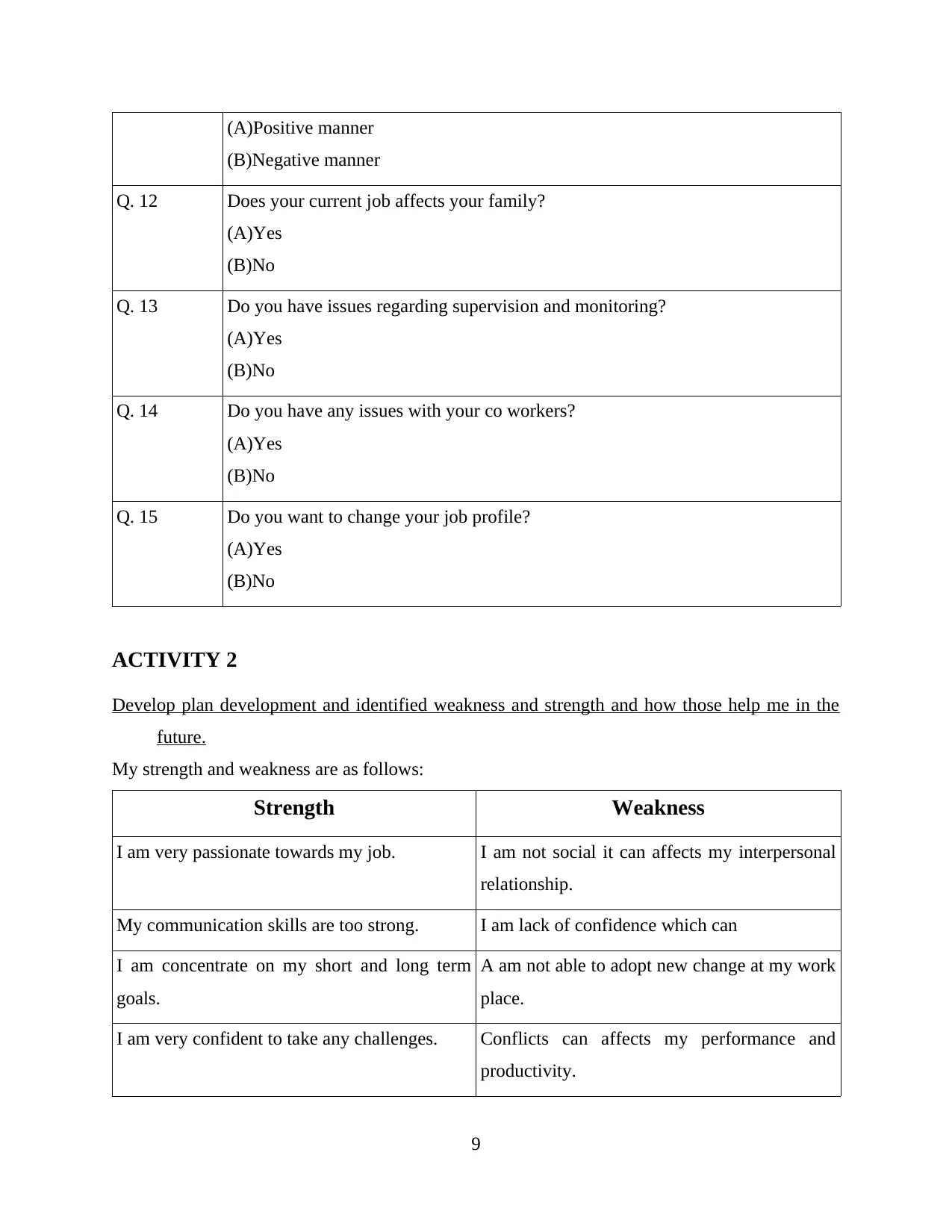
(A)Positive manner
(B)Negative manner
Q. 12 Does your current job affects your family?
(A)Yes
(B)No
Q. 13 Do you have issues regarding supervision and monitoring?
(A)Yes
(B)No
Q. 14 Do you have any issues with your co workers?
(A)Yes
(B)No
Q. 15 Do you want to change your job profile?
(A)Yes
(B)No
ACTIVITY 2
Develop plan development and identified weakness and strength and how those help me in the
future.
My strength and weakness are as follows:
Strength Weakness
I am very passionate towards my job. I am not social it can affects my interpersonal
relationship.
My communication skills are too strong. I am lack of confidence which can
I am concentrate on my short and long term
goals.
A am not able to adopt new change at my work
place.
I am very confident to take any challenges. Conflicts can affects my performance and
productivity.
9
(B)Negative manner
Q. 12 Does your current job affects your family?
(A)Yes
(B)No
Q. 13 Do you have issues regarding supervision and monitoring?
(A)Yes
(B)No
Q. 14 Do you have any issues with your co workers?
(A)Yes
(B)No
Q. 15 Do you want to change your job profile?
(A)Yes
(B)No
ACTIVITY 2
Develop plan development and identified weakness and strength and how those help me in the
future.
My strength and weakness are as follows:
Strength Weakness
I am very passionate towards my job. I am not social it can affects my interpersonal
relationship.
My communication skills are too strong. I am lack of confidence which can
I am concentrate on my short and long term
goals.
A am not able to adopt new change at my work
place.
I am very confident to take any challenges. Conflicts can affects my performance and
productivity.
9
⊘ This is a preview!⊘
Do you want full access?
Subscribe today to unlock all pages.

Trusted by 1+ million students worldwide
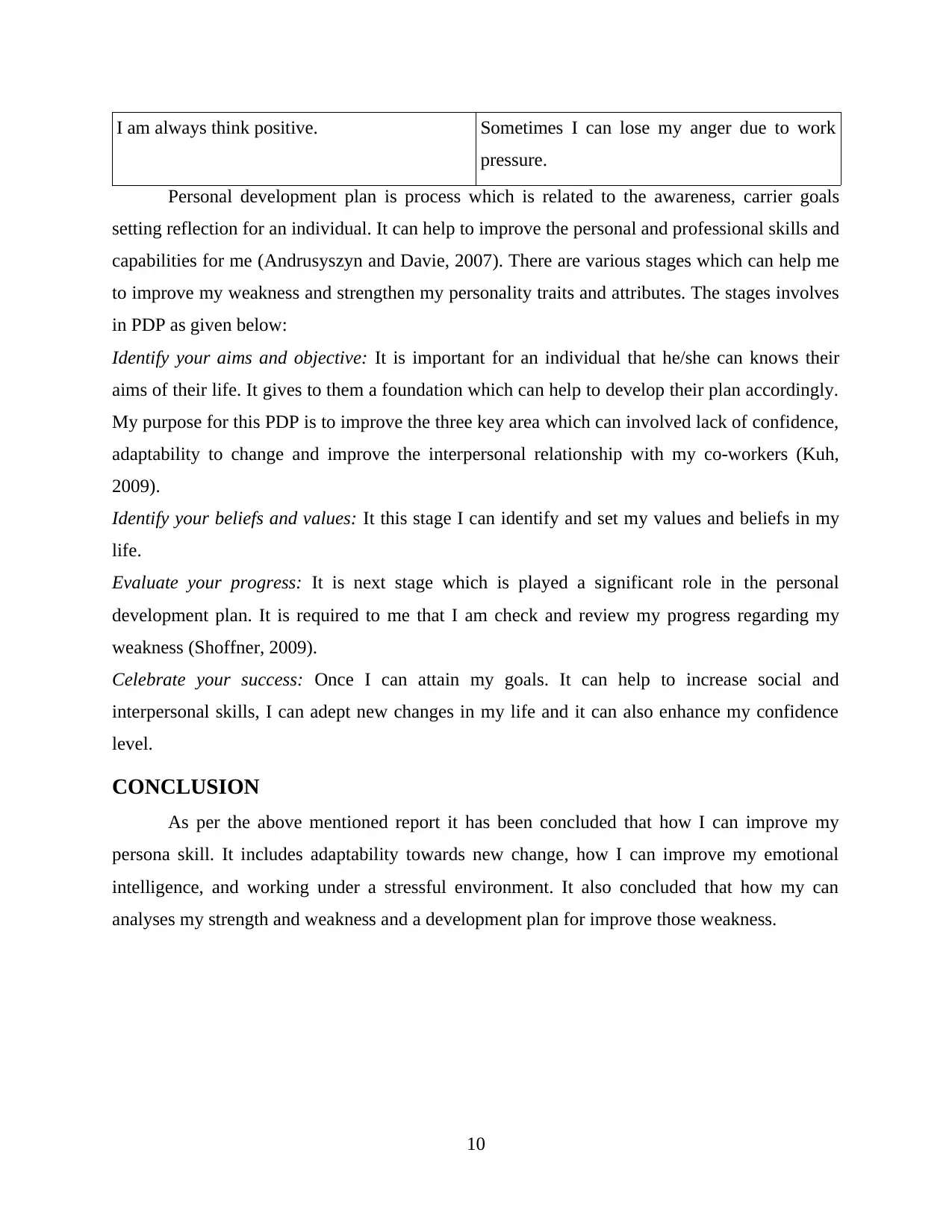
I am always think positive. Sometimes I can lose my anger due to work
pressure.
Personal development plan is process which is related to the awareness, carrier goals
setting reflection for an individual. It can help to improve the personal and professional skills and
capabilities for me (Andrusyszyn and Davie, 2007). There are various stages which can help me
to improve my weakness and strengthen my personality traits and attributes. The stages involves
in PDP as given below:
Identify your aims and objective: It is important for an individual that he/she can knows their
aims of their life. It gives to them a foundation which can help to develop their plan accordingly.
My purpose for this PDP is to improve the three key area which can involved lack of confidence,
adaptability to change and improve the interpersonal relationship with my co-workers (Kuh,
2009).
Identify your beliefs and values: It this stage I can identify and set my values and beliefs in my
life.
Evaluate your progress: It is next stage which is played a significant role in the personal
development plan. It is required to me that I am check and review my progress regarding my
weakness (Shoffner, 2009).
Celebrate your success: Once I can attain my goals. It can help to increase social and
interpersonal skills, I can adept new changes in my life and it can also enhance my confidence
level.
CONCLUSION
As per the above mentioned report it has been concluded that how I can improve my
persona skill. It includes adaptability towards new change, how I can improve my emotional
intelligence, and working under a stressful environment. It also concluded that how my can
analyses my strength and weakness and a development plan for improve those weakness.
10
pressure.
Personal development plan is process which is related to the awareness, carrier goals
setting reflection for an individual. It can help to improve the personal and professional skills and
capabilities for me (Andrusyszyn and Davie, 2007). There are various stages which can help me
to improve my weakness and strengthen my personality traits and attributes. The stages involves
in PDP as given below:
Identify your aims and objective: It is important for an individual that he/she can knows their
aims of their life. It gives to them a foundation which can help to develop their plan accordingly.
My purpose for this PDP is to improve the three key area which can involved lack of confidence,
adaptability to change and improve the interpersonal relationship with my co-workers (Kuh,
2009).
Identify your beliefs and values: It this stage I can identify and set my values and beliefs in my
life.
Evaluate your progress: It is next stage which is played a significant role in the personal
development plan. It is required to me that I am check and review my progress regarding my
weakness (Shoffner, 2009).
Celebrate your success: Once I can attain my goals. It can help to increase social and
interpersonal skills, I can adept new changes in my life and it can also enhance my confidence
level.
CONCLUSION
As per the above mentioned report it has been concluded that how I can improve my
persona skill. It includes adaptability towards new change, how I can improve my emotional
intelligence, and working under a stressful environment. It also concluded that how my can
analyses my strength and weakness and a development plan for improve those weakness.
10
Paraphrase This Document
Need a fresh take? Get an instant paraphrase of this document with our AI Paraphraser
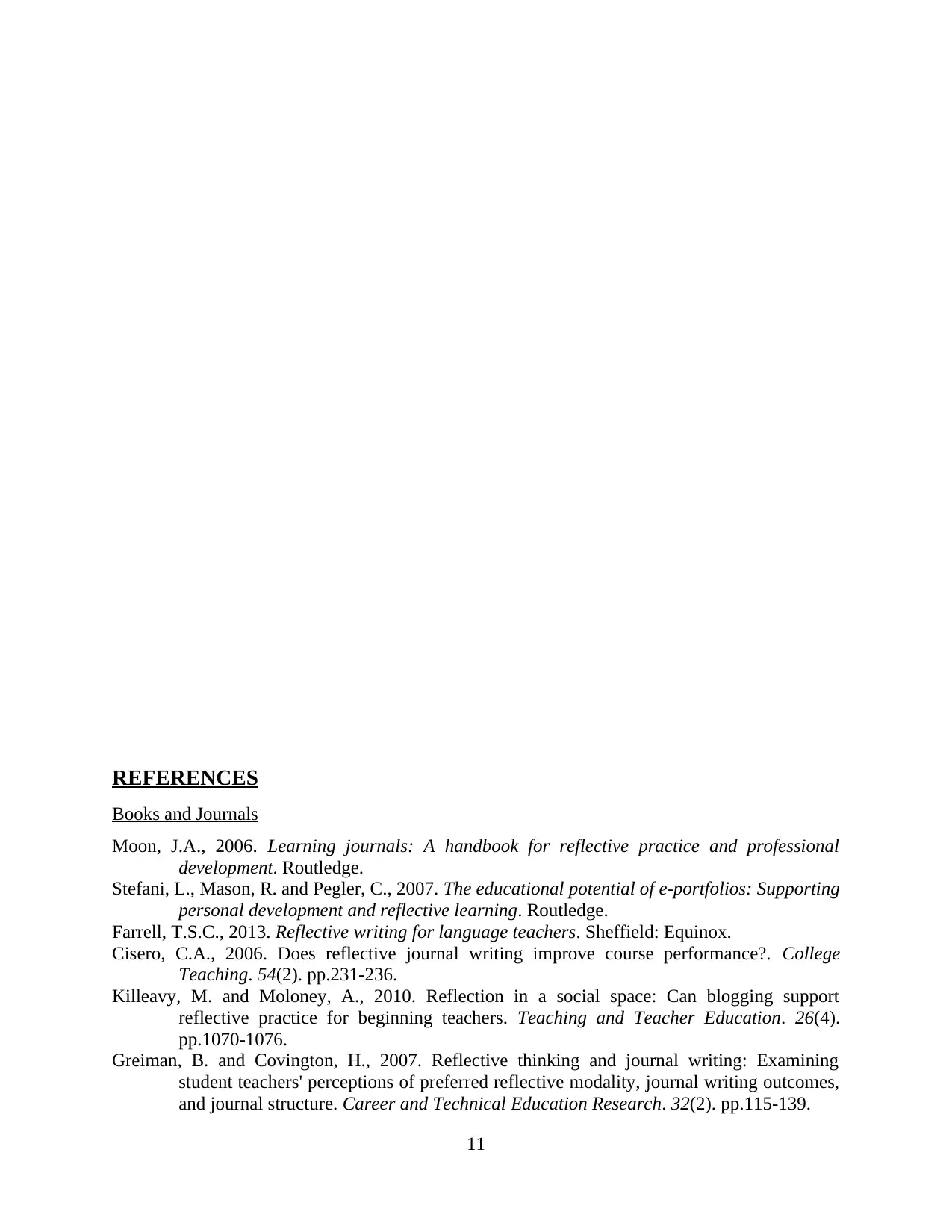
REFERENCES
Books and Journals
Moon, J.A., 2006. Learning journals: A handbook for reflective practice and professional
development. Routledge.
Stefani, L., Mason, R. and Pegler, C., 2007. The educational potential of e-portfolios: Supporting
personal development and reflective learning. Routledge.
Farrell, T.S.C., 2013. Reflective writing for language teachers. Sheffield: Equinox.
Cisero, C.A., 2006. Does reflective journal writing improve course performance?. College
Teaching. 54(2). pp.231-236.
Killeavy, M. and Moloney, A., 2010. Reflection in a social space: Can blogging support
reflective practice for beginning teachers. Teaching and Teacher Education. 26(4).
pp.1070-1076.
Greiman, B. and Covington, H., 2007. Reflective thinking and journal writing: Examining
student teachers' perceptions of preferred reflective modality, journal writing outcomes,
and journal structure. Career and Technical Education Research. 32(2). pp.115-139.
11
Books and Journals
Moon, J.A., 2006. Learning journals: A handbook for reflective practice and professional
development. Routledge.
Stefani, L., Mason, R. and Pegler, C., 2007. The educational potential of e-portfolios: Supporting
personal development and reflective learning. Routledge.
Farrell, T.S.C., 2013. Reflective writing for language teachers. Sheffield: Equinox.
Cisero, C.A., 2006. Does reflective journal writing improve course performance?. College
Teaching. 54(2). pp.231-236.
Killeavy, M. and Moloney, A., 2010. Reflection in a social space: Can blogging support
reflective practice for beginning teachers. Teaching and Teacher Education. 26(4).
pp.1070-1076.
Greiman, B. and Covington, H., 2007. Reflective thinking and journal writing: Examining
student teachers' perceptions of preferred reflective modality, journal writing outcomes,
and journal structure. Career and Technical Education Research. 32(2). pp.115-139.
11
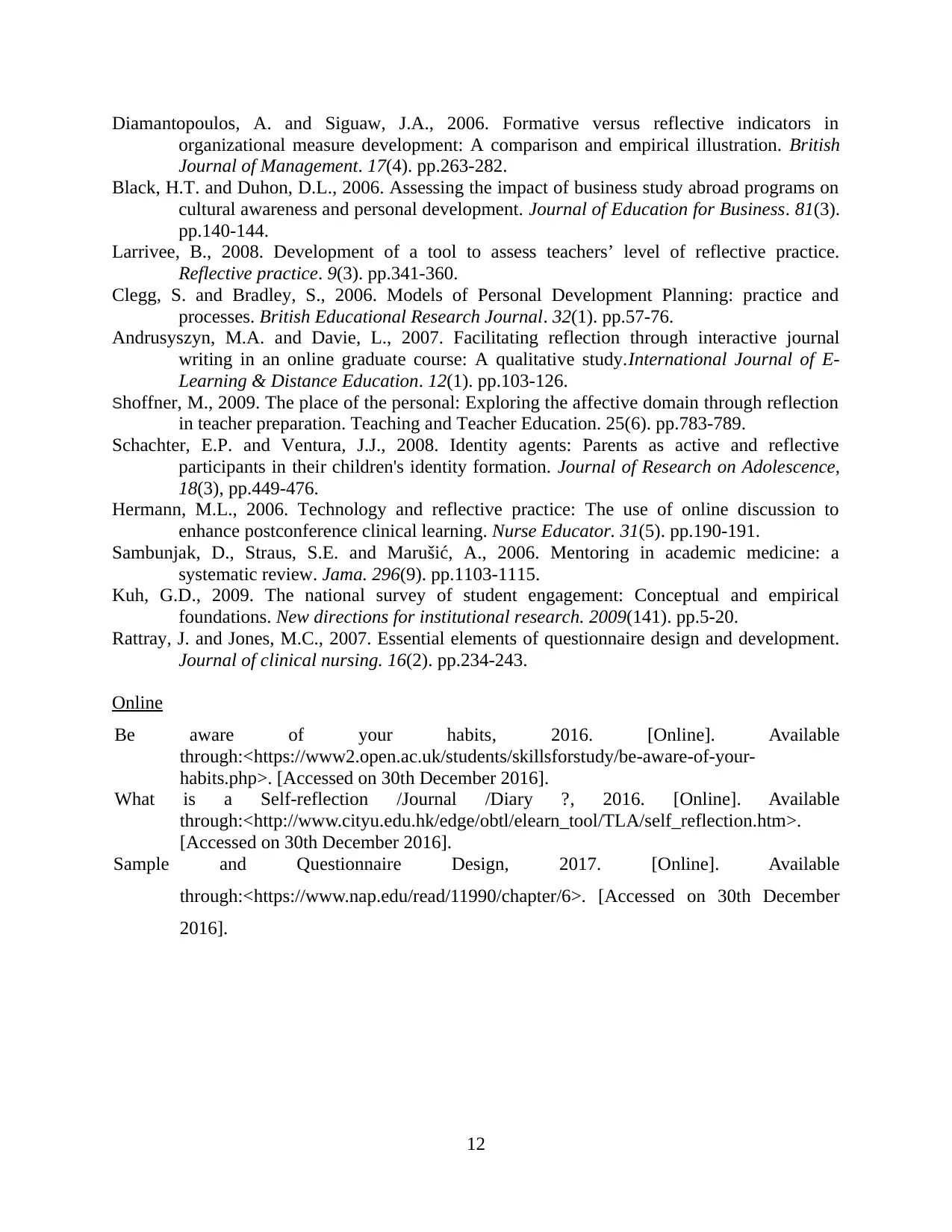
Diamantopoulos, A. and Siguaw, J.A., 2006. Formative versus reflective indicators in
organizational measure development: A comparison and empirical illustration. British
Journal of Management. 17(4). pp.263-282.
Black, H.T. and Duhon, D.L., 2006. Assessing the impact of business study abroad programs on
cultural awareness and personal development. Journal of Education for Business. 81(3).
pp.140-144.
Larrivee, B., 2008. Development of a tool to assess teachers’ level of reflective practice.
Reflective practice. 9(3). pp.341-360.
Clegg, S. and Bradley, S., 2006. Models of Personal Development Planning: practice and
processes. British Educational Research Journal. 32(1). pp.57-76.
Andrusyszyn, M.A. and Davie, L., 2007. Facilitating reflection through interactive journal
writing in an online graduate course: A qualitative study.International Journal of E-
Learning & Distance Education. 12(1). pp.103-126.
Shoffner, M., 2009. The place of the personal: Exploring the affective domain through reflection
in teacher preparation. Teaching and Teacher Education. 25(6). pp.783-789.
Schachter, E.P. and Ventura, J.J., 2008. Identity agents: Parents as active and reflective
participants in their children's identity formation. Journal of Research on Adolescence,
18(3), pp.449-476.
Hermann, M.L., 2006. Technology and reflective practice: The use of online discussion to
enhance postconference clinical learning. Nurse Educator. 31(5). pp.190-191.
Sambunjak, D., Straus, S.E. and Marušić, A., 2006. Mentoring in academic medicine: a
systematic review. Jama. 296(9). pp.1103-1115.
Kuh, G.D., 2009. The national survey of student engagement: Conceptual and empirical
foundations. New directions for institutional research. 2009(141). pp.5-20.
Rattray, J. and Jones, M.C., 2007. Essential elements of questionnaire design and development.
Journal of clinical nursing. 16(2). pp.234-243.
Online
Be aware of your habits, 2016. [Online]. Available
through:<https://www2.open.ac.uk/students/skillsforstudy/be-aware-of-your-
habits.php>. [Accessed on 30th December 2016].
What is a Self-reflection /Journal /Diary ?, 2016. [Online]. Available
through:<http://www.cityu.edu.hk/edge/obtl/elearn_tool/TLA/self_reflection.htm>.
[Accessed on 30th December 2016].
Sample and Questionnaire Design, 2017. [Online]. Available
through:<https://www.nap.edu/read/11990/chapter/6>. [Accessed on 30th December
2016].
12
organizational measure development: A comparison and empirical illustration. British
Journal of Management. 17(4). pp.263-282.
Black, H.T. and Duhon, D.L., 2006. Assessing the impact of business study abroad programs on
cultural awareness and personal development. Journal of Education for Business. 81(3).
pp.140-144.
Larrivee, B., 2008. Development of a tool to assess teachers’ level of reflective practice.
Reflective practice. 9(3). pp.341-360.
Clegg, S. and Bradley, S., 2006. Models of Personal Development Planning: practice and
processes. British Educational Research Journal. 32(1). pp.57-76.
Andrusyszyn, M.A. and Davie, L., 2007. Facilitating reflection through interactive journal
writing in an online graduate course: A qualitative study.International Journal of E-
Learning & Distance Education. 12(1). pp.103-126.
Shoffner, M., 2009. The place of the personal: Exploring the affective domain through reflection
in teacher preparation. Teaching and Teacher Education. 25(6). pp.783-789.
Schachter, E.P. and Ventura, J.J., 2008. Identity agents: Parents as active and reflective
participants in their children's identity formation. Journal of Research on Adolescence,
18(3), pp.449-476.
Hermann, M.L., 2006. Technology and reflective practice: The use of online discussion to
enhance postconference clinical learning. Nurse Educator. 31(5). pp.190-191.
Sambunjak, D., Straus, S.E. and Marušić, A., 2006. Mentoring in academic medicine: a
systematic review. Jama. 296(9). pp.1103-1115.
Kuh, G.D., 2009. The national survey of student engagement: Conceptual and empirical
foundations. New directions for institutional research. 2009(141). pp.5-20.
Rattray, J. and Jones, M.C., 2007. Essential elements of questionnaire design and development.
Journal of clinical nursing. 16(2). pp.234-243.
Online
Be aware of your habits, 2016. [Online]. Available
through:<https://www2.open.ac.uk/students/skillsforstudy/be-aware-of-your-
habits.php>. [Accessed on 30th December 2016].
What is a Self-reflection /Journal /Diary ?, 2016. [Online]. Available
through:<http://www.cityu.edu.hk/edge/obtl/elearn_tool/TLA/self_reflection.htm>.
[Accessed on 30th December 2016].
Sample and Questionnaire Design, 2017. [Online]. Available
through:<https://www.nap.edu/read/11990/chapter/6>. [Accessed on 30th December
2016].
12
⊘ This is a preview!⊘
Do you want full access?
Subscribe today to unlock all pages.

Trusted by 1+ million students worldwide
1 out of 15
Related Documents
Your All-in-One AI-Powered Toolkit for Academic Success.
+13062052269
info@desklib.com
Available 24*7 on WhatsApp / Email
![[object Object]](/_next/static/media/star-bottom.7253800d.svg)
Unlock your academic potential
© 2024 | Zucol Services PVT LTD | All rights reserved.




